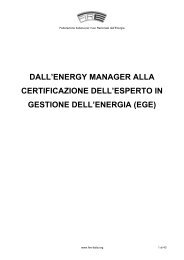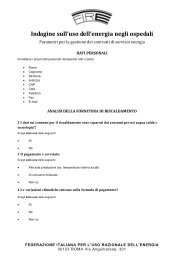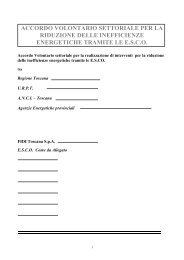part 1: overview of cogeneration and its status in asia - Fire
part 1: overview of cogeneration and its status in asia - Fire
part 1: overview of cogeneration and its status in asia - Fire
Create successful ePaper yourself
Turn your PDF publications into a flip-book with our unique Google optimized e-Paper software.
Summary <strong>of</strong> country study – Viet Nam<br />
4.1.4 Government policies <strong>and</strong> strategies for private power generation<br />
Accord<strong>in</strong>g to the M<strong>in</strong>istry <strong>of</strong> Plann<strong>in</strong>g <strong>and</strong> Investment, the private power generation that is<br />
considered as an <strong>in</strong>frastructure development activity, is given a favoured <strong>status</strong> <strong>and</strong> is<br />
promoted by the government. The power generation sector can get the priority <strong>of</strong> foreign<br />
currency exchange for the purpose <strong>of</strong> transfer <strong>of</strong> pr<strong>of</strong><strong>its</strong> made by foreign <strong>in</strong>vestors.<br />
In Viet Nam, big power plants can be developed through various forms <strong>of</strong> <strong>in</strong>vestment: Build-<br />
Operate-Transfer, credit from supplier, self-development by Vietnamese companies (e.g.<br />
EVN <strong>and</strong> VINACOAL) <strong>in</strong> collaboration with foreign companies.<br />
However, the development <strong>of</strong> big private power plant is quite complicated <strong>and</strong> there is a lot <strong>of</strong><br />
competition. Small <strong>and</strong> medium scale private power generat<strong>in</strong>g un<strong>its</strong>, <strong>in</strong>clud<strong>in</strong>g <strong>cogeneration</strong><br />
plant, <strong>in</strong>side <strong>in</strong>dustrial parks, export-process<strong>in</strong>g zones or comb<strong>in</strong>ed with <strong>in</strong>dustrial factories<br />
seem to be more suitable for Viet Nam.<br />
Security Package<br />
For the big power plants, the <strong>in</strong>ternational conditions <strong>and</strong> practices are respected. Model<br />
Implementation Agreement, Fuel Supply Agreement are prepared. The Government<br />
guarantees power purchase agreement obligations <strong>of</strong> the concerned utilities. For small <strong>and</strong><br />
medium-scale private power plants, there is no such fixed model now. So far, EVN has<br />
bought electricity from some sugar mills <strong>and</strong> is negotiat<strong>in</strong>g to buy excess electricity from<br />
paper mills on the basis <strong>of</strong> energy charge alone (without any payment for capacity charge).<br />
Tariff for bulk purchase <strong>of</strong> power at busbar<br />
The sell<strong>in</strong>g price <strong>of</strong> electricity from small <strong>and</strong> medium private power plants varies from one<br />
case to another.<br />
EVN can now accept to buy <strong>of</strong>f excess electricity from small power producers with a daily<br />
spot tariff as follows: US$ 0.05/kWh dur<strong>in</strong>g peak load, US$ 0.04/kWh dur<strong>in</strong>g normal hours<br />
<strong>and</strong> US$ 0.03/kWh dur<strong>in</strong>g <strong>of</strong>f-peak hours. However, the capacity charge is not mentioned.<br />
For big power plants, EVN <strong>and</strong> the National Committee <strong>of</strong> Price must approve the purchase<br />
tariff <strong>of</strong> electricity. Small <strong>and</strong> medium scale plants can sell electricity directly to factories or<br />
<strong>in</strong>dustrial park but the Prov<strong>in</strong>cial Authority must approve the tariff. The electricity produced <strong>in</strong><br />
excess can be sold to EVN at a negotiated price, without capacity charge, which is <strong>of</strong>ten<br />
around 70 per cent <strong>of</strong> EVN’s electricity sell<strong>in</strong>g price. In some exist<strong>in</strong>g cases, EVN accepts a<br />
price <strong>of</strong> around US$ 0.043/kWh. In an <strong>in</strong>terview done <strong>in</strong> Mekong Delta, the Prov<strong>in</strong>cial<br />
Electricity Company consented to buy electricity at around 600 VND/kWh.<br />
So far, there is no effective legal system <strong>in</strong> Viet Nam to oblige electricity utilities to purchase<br />
power from small/decentralized power producers.<br />
163









